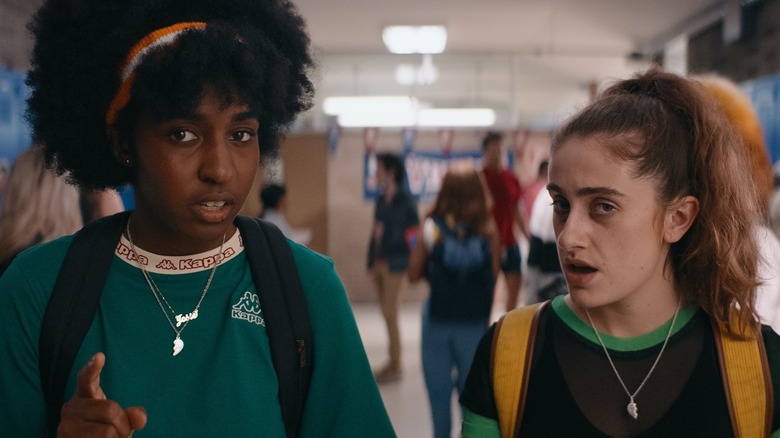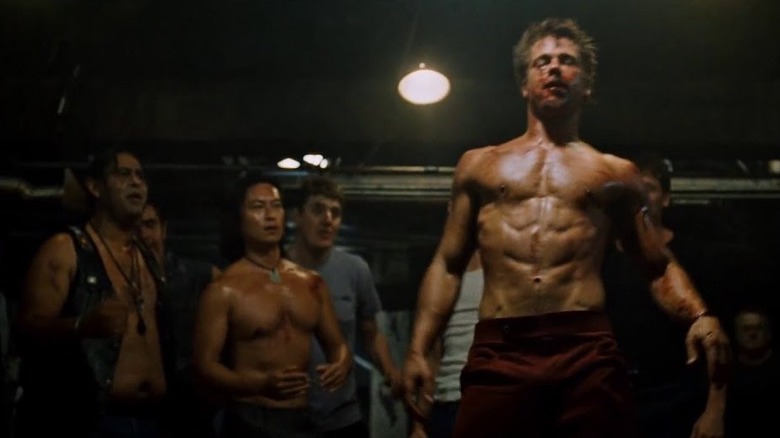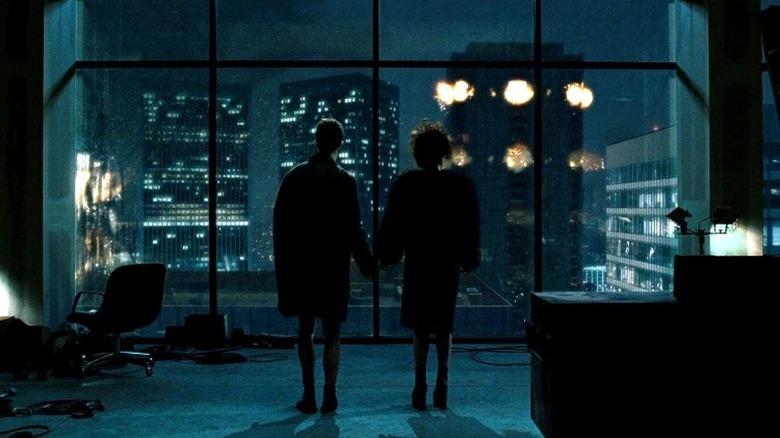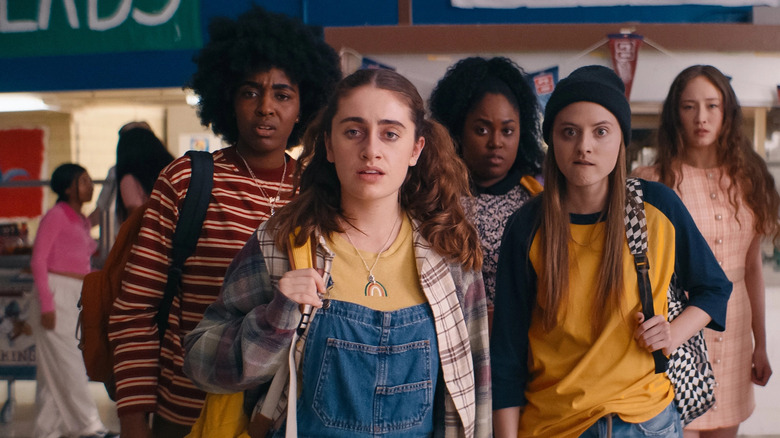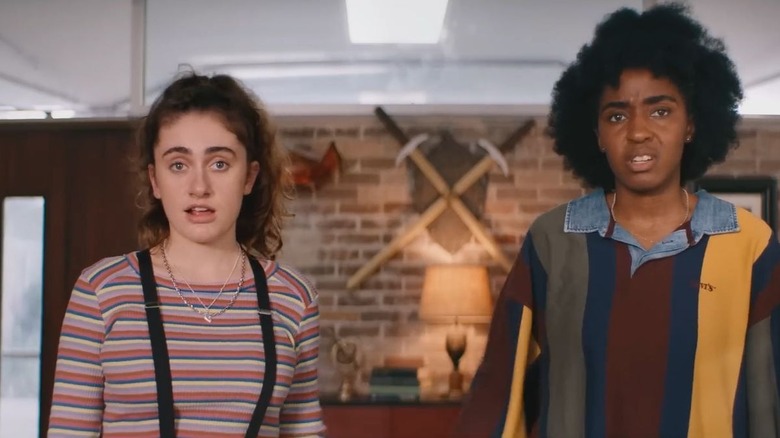Bottoms' Message Against Toxic Masculinity Succeeds Where Fight Club Failed
Contains spoilers for "Bottoms" ... and "Fight Club," but that one came out in 1999, and you should've seen it by now.
The new comedy "Bottoms" follows two high school seniors — PJ (Rachel Sennott) and Josie (Ayo Edebiri) — who start a fight club to try to hook up with their pretty classmates. While a "fight club" is at the center of the movie, "Bottoms" doesn't necessarily have a lot in common with the seminal 1999 film "Fight Club" ... or does it?
Both movies end with a massive explosion. Each has a scene where a supporting character gets beaten to a bloody pulp, signifying how the protagonists have lost control of their fight clubs. And they both comment on how everyone suffers when toxic masculinity is allowed to run rampant; only "Bottoms" is arguably more successful in that message than "Fight Club."
"Fight Club" tackles numerous themes, from consumerism to the dichotomy between reality and the artificial. And it's very easy to see how the movie deals with modern conceptions of toxic masculinity in the way the all-male fight club beat each other up without developing any stronger bonds within their communities, ultimately isolating themselves and hastening their resentment toward society. But one has to question whether the film succeeded in that message if so many men today have taken away the wrong message. And perhaps that's where "Bottoms" can set them right.
Does satire work if so many people miss the message?
Here's the deal: some movies do this thing where the protagonist isn't always representative of the qualities you want to exemplify in yourself. Sometimes, they're cautionary tales, and that's the case with "Fight Club." The Narrator (Edward Norton) is deeply unhappy with life. He feels alienated from others, and he only begins to feel something again when he starts fighting other men at the request of Tyler Durden (Brad Pitt). All of these men are like the Narrator, who feel neglected by society, so they resort to violence and eventually terrorism.
It's obvious the movie isn't actively promoting this lifestyle, but those themes get lost in a glossy cover. Looking through various subreddits, TikToks, and the overarching online incel community shows how many men in 2023 see Tyler Durden as a figure to aspire to rather than a warning. Many men see a guy who's buff and doesn't rely on women for anything except for sex, given Tyler's relationship with Marla (Helena Bonham Carter). Tyler is an attractive, charismatic spokesperson who's a complete hypocrite. He laments how beautiful models appear on magazine covers while looking like a model himself. The satire is fully there, but many men still miss it entirely.
Part of this could be due to the medium. Movies are inherently cinematic, so the book arguably does a better job of getting this point across. The message is clear, but many viewers only took away the glorification of violence. And honestly, seeing how primarily men were the ones who needed to learn a lesson from "Fight Club," it's easy to write that messaging off as a failure.
Bottoms makes men the joke they were meant to be
If "Fight Club" was too subtle or glorified the idea of male angst, "Bottoms" hits you over the head with what it's trying to get across.
The boys in "Bottoms" are the butt of every joke. The star quarterback, Jeff (Nicholas Galitzine), feels he's entitled to everyone and everything, even if that means cheating on his girlfriend, Isabel (Havana Rose Liu). Jeff has posters with his image all over the school, plus a mural that parodies the Sistine Chapel, where he reaches out toward the hand of God. In this world, the Brad Pitts of the high school are celebrated and revered, which is much truer to real life than what "Fight Club" presents.
There's definitely something to be said about modern male alienation, which "Fight Club" touches on. Unfortunately, the message many men seem to have taken away from the film is that being a man in the 21st century is the unluckiest lot you can have in life, thereby justifying any ensuing violence. But "Bottoms" makes it clear that being a man still comes with an extraordinary amount of privilege. The conventionally attractive football players are basically gods at the school. They get away with bullying everyone they see as inferior, and this is the guise the fight club uses. PJ and Josie may have started it to hook up with pretty girls, but the participants do actually learn some moves to defend themselves.
Out of context, it's easy to see why some men would model themselves after Tyler Durden. But no one would want to be Jeff in "Bottoms" because he's a total tool. "Bottoms" calls out toxic masculinity for what it is, and that includes pointing out how the biggest victims of it are often men themselves.
Men are the ones who suffer from toxic masculinity (and it's up to femininity to save them)
While plenty of girls suffer from toxic masculinity in "Bottoms," it's ultimately Jeff who's in the greatest danger. Toward the end of the film, it's revealed that the big football match everyone's been talking about is a murderous tradition. The opposing team always kills someone from the high school; in this instance, the plan is to kill Jeff. While they might hate him, PJ and Josie round up their friends to try to save him despite him being a jerk to them throughout the film. It's clear the masculinity problem in this heightened reality isn't exclusive to their high school, and it ends with someone literally dying to appease spectators. All of this stems from a football game in which every boy is a willing participant, and Jeff's the one who has the most to lose.
A similar sentiment is expressed in the ending of "Fight Club." The Narrator gets rid of Tyler Durden by shooting himself, and when Marla comes later and asks who did it, he says he did it to himself. That line exhibits everything there is about toxic masculinity and the role it has on men. Men exemplify harmful traits, hoping to regain some semblance of power or control, but all they do is end up hurting themselves. All of the suffering the Narrator has endured has been by his own hand. Not society. Not women. He did it to himself.
In "Bottoms," one could also say that Jeff brings the attempted murder onto himself. He chooses to be part of this path that results in a high schooler dying for the entertainment of others, but the thing that saves him is the women he tries to subjugate.
As is unfortunately the case, women clean up men's messes
As the city explodes around the Narrator, the only person who remains by his side is Marla. After belittling her throughout the movie, the two hold hands and watch the destruction around them, and the two are still together in the graphic novel, "Fight Club 2." It shows how femininity is needed to combat toxic masculinity, and "Bottoms" offers a similar ending where it's up to the girls to save Jeff.
Upon learning about his fate, the girls crash the football game and battle the opposing team, all to save a guy who couldn't care less about any of them. Like "Fight Club," Jeff only has himself to blame for being in this situation in the first place, but "Bottoms" goes the extra step of showing how toxic masculinity is often cyclical. Many men likely learn unhealthy traits (not showing emotion, espousing violence) from their fathers and other male figures they had in adolescence. "Bottoms" establishes that killing someone during a football game is a tradition, and it's by no means a healthy one. While most of the public sits by and allows it to transpire, it takes the concerted effort of girls who have been belittled by the system to step in and chart a new course.
Is it fair for women to be responsible for rehabilitating men with dangerous viewpoints? Of course not. But sadly, that's what tends to happen. Marla had to be there for the Narrator, and the girls had to rally to save the quarterback. But in both instances, it at least seems as though those pockets of toxic masculinity will improve in their respective worlds.
Could Bottoms be the remedy to a generation of Tyler Durdens?
It's hard to fault the creatives of "Fight Club" for what some audience members took from the film. While it's meant to be satirical, it went over plenty of people's heads, which is bound to happen with any piece of art. After all, "The Boys" is the least subtle satire ever, and there are still men who idolize Homelander (Antony Starr). Some people just won't get the message, no matter how something is written or directed. But that likely won't be a problem for "Bottoms."
Nothing about toxic masculinity is glamorized in the teen comedy. Men who exhibit those traits are portrayed as fools who can't even save themselves in the end. "Bottoms" shows the harmful effects of such an ideology, both on women who are the direct victims of the mentality and the men who suffer in the long run. The question is whether men who describe themselves as "incels" will see "Bottoms" and potentially learn something from it. Unfortunately, it may be one of those cases where the people who need to understand the message the most will dismiss the film as "woke" and ignore it entirely.
Hopefully, "Bottoms" does well at the box office, and if it doesn't, it could follow the path of "Fight Club" and gain cult status over time, so future generations can take in what it has to say. Toxic masculinity probably isn't going anywhere anytime soon, so audiences will continue needing art to spell out its harmful effects for some time to come. And you can do your part by watching "Bottoms," in limited theaters now and getting a wide release on September 1.
